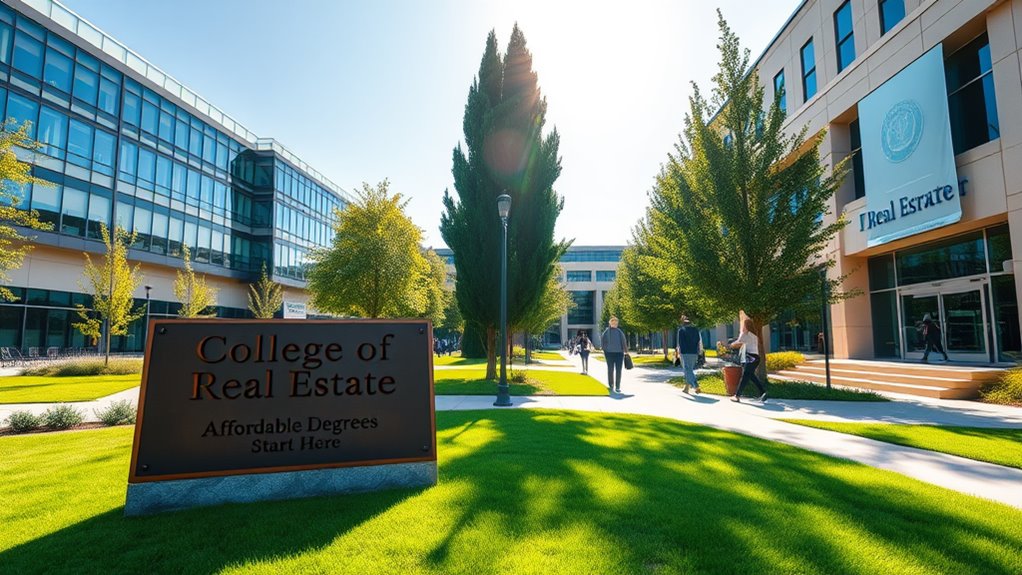Texas has top universities for real estate programs, with Texas Christian University (TCU) leading based on average salaries of $64,493 post-graduation. Baylor University offers strong earning potential at $57,318, though with higher tuition at $40,720. University of North Texas (UNT) balances affordability and income, with graduates earning $52,107 and lower average debt. University of Texas at San Antonio (UTSA) is the most affordable at $7,447. Southern Methodist University (SMU) is pricey but prestigious. Discover further insights to make an informed choice.
Key Takeaways
- Texas Christian University (TCU) offers the highest average salary ($64,493) two years post-graduation for real estate programs.
- Baylor University ranks second with graduates earning $57,318 and manageable debt of $27,000.
- University of North Texas (UNT) provides affordability with $52,107 average salary and low debt of $14,809.
- University of Texas at San Antonio (UTSA) is the most affordable with tuition at $7,447 and a 78% acceptance rate.
- Southern Methodist University (SMU) is the most expensive ($48,190) but offers a smaller, focused program with 62 students.
Best Universities for Real Estate Programs in Texas
Texas Christian University (TCU) leads the state as the best university for real estate programs, with graduates earning an average salary of $64,493 two years post-graduation and a program size of 90 students. If you’re searching for the best colleges for real estate in Texas, TCU’s strong salary outcomes and manageable class sizes make it a top choice. Baylor University ranks second, offering graduates an average salary of $57,318, though with a higher debt load of $27,000. The University of North Texas (UNT) takes the third spot, with graduates earning $52,107 and carrying a lower average debt of $14,809, making it a balanced option. For affordability, the University of Texas at San Antonio (UTSA) stands out with tuition costs of $7,447 and a 78% acceptance rate. Conversely, Southern Methodist University (SMU) is the most expensive at $48,190, with a smaller program size of 62 students. These colleges in Texas provide diverse options tailored to your priorities.
Highest Paying Real Estate Careers
Because income potential is a key factor in career decisions, real estate careers offer some of the most lucrative opportunities in the industry. Among the highest paying real estate careers, Real Estate Brokers top the list, with earnings primarily driven by commissions on property sales. Property Managers also excel, often earning over $75,000 annually, especially when managing large or high-value properties. Real Estate Developers, who oversee projects from planning to completion, frequently make over $100,000 annually. Earning advanced degrees, such as a Master’s in Real Estate, or certifications like the CCIM designation, can greatly boost your earning potential and open doors to senior roles. Attending well-regarded colleges for real estate not only provides foundational knowledge but also fosters the networking opportunities and industry connections essential for securing these high-paying positions. Your career trajectory in real estate often hinges on the relationships and expertise you build early on.
Most Affordable Real Estate Degree Programs

When analyzing tuition costs, the University of Texas at San Antonio stands out with its $7,447 average tuition, markedly lower than Baylor University’s $40,720. Financial aid options at UTSA further reduce the burden, as graduates typically carry less debt compared to more expensive programs. This affordability, combined with a $48,432 average post-graduation salary, makes it a financially prudent choice.
Tuition Cost Analysis
Several factors make the University of Texas at San Antonio (UTSA) the most affordable option for a real estate degree, with an average tuition cost of $7,447. When comparing real estate programs, Texas A&M University offers competitive tuition, though annual rates fluctuate. Baylor University, while pricier than UTSA, keeps average student debt at $27,000 for real estate graduates. In contrast, Southern Methodist University (SMU) stands as the most expensive option in Texas, with tuition averaging $48,190. You should weigh tuition costs against post-graduation earnings, as UTSA alumni report an average salary of $48,432 two years after completing their degree. By analyzing these figures, you can make an informed decision about the financial commitment required for real estate programs in Texas. Prioritize affordability and long-term financial outcomes when selecting a program.
Financial Aid Options
Exploring financial aid options is essential for managing tuition expenses in real estate degree programs, particularly at higher-priced institutions. At Southern Methodist University (SMU), where tuition averages $48,190, financial aid can greatly reduce out-of-pocket costs. Similarly, Texas Christian University (TCU), with tuition at $40,720, demands careful financial planning to mitigate expenses. Baylor University graduates face an average debt of $27,000, underscoring the importance of leveraging scholarships, grants, and loans. Even at the University of Texas at San Antonio (UTSA), where tuition is $7,447, financial aid options can further ease the burden. You should research institutional aid, federal programs, and private scholarships to offset tuition costs. By comparing aid packages, you can make informed decisions, ensuring affordability without compromising educational quality.
Student Enrollment and Demographics in Real Estate
With 1,343 students enrolled in Real Estate programs nationwide, the field demonstrates a significant gender disparity, as 71% of enrollees are male compared to 28% female. This imbalance highlights a broader trend in the industry, where male students majoring in Real Estate outnumber their female counterparts nearly 3 to 1. Universities offering these programs often see a concentration of students from states like Texas, which produces the highest number of Real Estate graduates due to its robust market and educational focus. The demographic composition of these programs may shape classroom dynamics and collaborative opportunities, as male students dominate peer interactions. While the average starting salary for graduates with a Bachelor’s degree in Real Estate is $57,450, the gender skew in enrollment raises questions about equitable representation and future leadership diversity in the field.
Networking Opportunities in Real Estate Education

Top real estate programs often host industry speaker events featuring executives and entrepreneurs, providing you with direct insights and networking opportunities. Alumni connection programs, like those at UT Austin and SMU, bridge the gap between students and professionals, enhancing career prospects. These initiatives are essential for building relationships that can lead to internships, mentorships, and job placements in the competitive real estate sector.
Industry Speaker Events
While industry speaker events are a staple of many real estate programs, their impact extends beyond mere exposure to industry trends. These events provide you with direct access to seasoned professionals, fostering relationships that can shape your career trajectory. At Southern Methodist University, the Folsom Institute for Real Estate hosts guest speakers who offer insights into market dynamics and practical strategies. Similarly, Texas A&M University’s Real Estate Research Institute organizes events that connect you with leaders in the field.
- Exclusive Access: Engage with top-tier professionals in intimate settings.
- Practical Insights: Gain real-world perspectives on market trends.
- Networking Opportunities: Build connections with industry stakeholders.
- Career Development: Identify mentors and potential job leads.
- Skill Enhancement: Learn directly from experts in specialized areas.
These events are critical for bridging academic knowledge with industry practice.
Alumni Connection Programs
Alumni connection programs play a pivotal role in real estate education, offering students a direct pathway to industry professionals and career advancement. Universities like the University of Texas at Austin organize networking events and case competitions through their Real Estate Centers, connecting you with seasoned professionals. Southern Methodist University’s Folsom Institute for Real Estate hosts alumni-led guest speaker events, providing insights from influential figures. Texas A&M University’s Mays Business School engages you with real estate organizations, expanding your network. Baylor University’s Hankamer School of Business integrates alumni into elective courses, fostering mentorship opportunities. Strong alumni networks, such as those at Texas Christian University, often lead to internships and job placements. These programs guarantee you’re not just learning theory but building connections that position you for success in the real estate industry.
Impact of Location on Real Estate Career Prospects
Choosing a college in a prime real estate market can give you a distinct advantage in your career. The location of your institution directly impacts internship availability, networking opportunities, and access to thriving job markets. For instance, Best Colleges in Texas, known for their robust real estate programs, place you in a state with a high demand for housing and a strong job market for graduates. Metropolitan areas, such as New York or California, offer proximity to major real estate development hubs, enhancing hands-on learning. Here’s how location shapes your career prospects:
- Urban areas provide access to real estate firms, internships, and networking events.
- Top markets like Texas offer robust job opportunities post-graduation.
- Metropolitan colleges foster strong alumni networks in real estate.
- Proximity to development hubs guarantees hands-on experience with local projects.
- High-demand housing markets increase competitive employment prospects for graduates.
- Analyzing local market conditions
ensures informed decisions for long-term rental investments.
Leveraging location strategically can considerably accelerate your real estate career.
Conclusion
If you’re considering a real estate degree, note that Texas graduates earn a median salary of $78,000 within five years. Networking opportunities in top programs, like those at the University of Texas, boost career prospects considerably. Location matters—cities with growing markets offer higher entry-level pay. Data shows 62% of real estate professionals credit their alma mater’s connections for job placements. Prioritize affordability and career potential when choosing your program to maximize returns.




